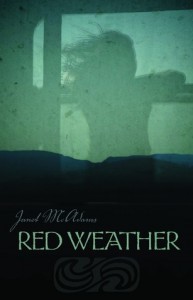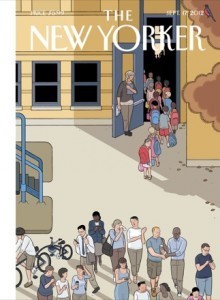Clifford Garstang's Blog, page 95
September 21, 2012
Book Review and Giveaway: Red Weather by Janet McAdams
[Scroll down for details on the giveaway.]
Red Weather
Janet McAdams
University of Arizona Press (2012)
Does Barbara Kingsolver know about this book? (More about Kingsolver below.)
When Neva finally musters the courage to leave her husband—a cartoonish and controlling philanderer who had been her teacher in college—she flees Atlanta, Georgia for Central America. But her choice of destination isn’t just because she’s in hiding from the husband, who doesn’t seem to care that she’s gone. Rather, she goes to the troubled nation of Coatepeque—a stand in for El Salvador—because she thinks that might have been the destination of her parents, who disappeared into apparent exile when she was a child, leaving her to be raised by her grandparents.
It’s a recipe for a decent plot: an innocent abroad, in a war-torn country, no less, searches for something she’s lost, getting into a fair amount of trouble along the way. And there’s no question that the story holds the reader’s interest. And that’s without considering the shadowy lover, or the earthquake, or the mystery surrounding her parents, which is gradually revealed.
For a woman who has not been allowed much independence, Neva proves surprisingly resourceful as her adventure in Coatepeque begins, and that’s at least part of the point. No doubt her husband would be surprised, but she manages to find a place to stay and a teaching job, despite her nearly non-existent Spanish and her general naiveté. And then she becomes more entangled in the local community—the American military advisors, the foreign volunteers, the aid workers, and the handsome, secretive Tomás.
And yet . . . for reasons that aren’t clear, she delays her efforts to search for her parents. There are security issues in the country, certainly, but she doesn’t even ask questions. She doesn’t confide in anyone, including her roommates. She is in limbo, and she seems to be okay with that, no matter how frustrating that might be for the reader. That, too, is part of the point.
McAdams has woven into this thin volume a host of political issues that are sure to remind the reader of Barbara Kingsolver’s work , and it’s not hard to see where her sympathies lie. There is an element of feminism as Neva declares her independence and is eventually able to express herself. Neva, like the author, is part Native American, and the mystery surrounding Neva’s parents is related to the criminal mistreatment of Native Americans in the United States. The civil war in Coatepeque, too, is a manifestation of this theme, and “red” refers not only to the indigenous peoples but also to the Communist rebels and their fellow travelers.
If I have a complaint about this book, it’s that the ending seems a bit rushed. When the crisis comes, there seems little time for Neva—or the reader, for that matter—to reflect. And maybe that, too, is part of the point.
Book Giveaway! Win a copy of Red Weather. All you have to do is comment below AND go here to sign up for my mailing list. In two weeks, I’ll select a winner at random.
September 18, 2012
Upcoming Readings and Signings
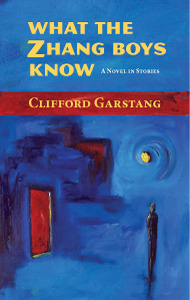 With the official launch of my new book fast approaching (October 1), the pace of appearances is beginning to pick up.
With the official launch of my new book fast approaching (October 1), the pace of appearances is beginning to pick up.
On Thursday, September 20, I’ll be at the Westlake Library at Smith Mountain Lake, Virginia, at 5:30 pm. Read more about that event here: Well-traveled Author to Speak at Library.
On Saturday, September 22, I have two signings in the city of Staunton, VA. From 10AM to 1PM I’ll be the Sacred Circle. From 2PM to 5PM I’ll be at BookWorks. Both fine stores are on Beverley in the Historic Downtown area.
On Sunday, September 23, I’ll be signing books at Books & Co. in downtown Lexington, VA, from 2PM to 4PM.
On Tuesday, September 25, I’ll be giving a reading and also signing books at Over the Moon Bookstore in Crozet, at 6pm. This appearance is part of the Virginia Festival of the Book’s 12 Days of Fall Foreword–a bit of a taste of what the Festival will have to offer next March. (Be sure and check out all the other events on the Fall Foreword schedule.)
Next Thursday, September 27, I’ve got two events. First is an appearance in the morning (10:30 AM) on the campus of George Mason University for the annual Fall for the Book Festival. Later that evening I’ll be featured at a Fireside Chat sponsored by the Northwestern University Club of DC.
More events to be announced soon!
Win a copy of WHAT THE ZHANG BOYS KNOW!
Goodreads Book Giveaway
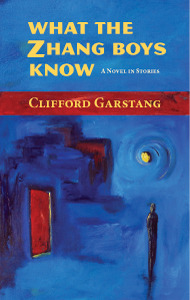
What the Zhang Boys Know
by Clifford Garstang
Giveaway ends October 15, 2012.
See the giveaway details
at Goodreads.
September 17, 2012
The New Yorker: “The Third-Born” by Mohsin Hamid
September 24, 2012: “The Third-Born” by Mohsin Hamid
As far as I’m concerned, this “story” has two strikes against it. First, it is an excerpt from a forthcoming novel (about the boy in the story) and is okay, I suppose, as an excerpt but unsatisfying as a story. Second, the author uses a second person that strays into the omniscient, and for me fails on both counts. I get that the narrative voice might want to move away from the boy’s consciousness (which is what the author says in the Q&A with Mohsin Hamid), but then why not do it in third person.
As I’ve frequently argued, there really ought to be a reason for second person if that’s what the author chooses, and whether it makes sense depends on the implied narrator. Often, second person is used when the narrator is speaking to himself—either now or at a different time in his life. And that works, sometimes, if, for example, there has been some trauma that has the effect of separating aspects of the narrator—sort of an out of body experience. That doesn’t seem to be the case in this story, although perhaps it is in the novel (but that doesn’t explain the wandering into omniscience). Another way second person is used is the true second person—when a narrator is addressing someone (other than himself). That might be the case here, and might help explain the omniscience, but we have no clues in this excerpt as to who the narrator might be.
But I’ve forgotten the story. It begins with a young Pakistani boy very ill with Hepatitis. He and his siblings and mother live in the country while his father works as a cook in the city. For some reason, the father decides they should all move into the city with him, the result of which is that the sister has to go to work, and then the brother, while the boy remains in school, thanks to his birth order.
And that’s about it . . .
I have to say, this does not make me want to read the novel.
Grateful
 I am on my way home this morning after a terrific few days in Chicago. I was here for a conference at Northwestern University, but stayed an extra day in order to celebrate the release of my new book with friends. I was so pleased that many of my Chicago-area friends joined me for drinks yesterday.
I am on my way home this morning after a terrific few days in Chicago. I was here for a conference at Northwestern University, but stayed an extra day in order to celebrate the release of my new book with friends. I was so pleased that many of my Chicago-area friends joined me for drinks yesterday.
I’m excited that the new book is starting to find its way into the hands of readers.
And I’m grateful for all of them!
September 11, 2012
Man Booker Prize Short List
 I’m a fan of the Man Booker Prize, and I usually try to read at least the winning book each year and sometimes a few of the finalists. I haven’t been keeping up very well, lately, though, and the short list has rolled around again, announced here. Hilary Mantel is the favorite, having won for her previous book a few years ago.
I’m a fan of the Man Booker Prize, and I usually try to read at least the winning book each year and sometimes a few of the finalists. I haven’t been keeping up very well, lately, though, and the short list has rolled around again, announced here. Hilary Mantel is the favorite, having won for her previous book a few years ago.
Here’s the list:
Tan Twan Eng, The Garden of Evening Mists (Myrmidon Books)
Deborah Levy, Swimming Home (And Other Stories/Faber & Faber)
Hilary Mantel, Bring up the Bodies (Fourth Estate)
Alison Moore, The Lighthouse (Salt)
Will Self, Umbrella (Bloomsbury)
Jeet Thayil, Narcopolis (Faber & Faber)
September 10, 2012
The New Yorker: “The Last Few Kilometres” by Leonard Tsypkin
September 17, 2012: “The Last Few Kilometres” by Leonard Tsypkin
I don’t recognize the name of the writer, from Minsk, who died in 1982. The contributors’ notes tell us that this story was written in 1972.
It’s behind the paywall, so let me summarize it: an elderly man (he didn’t bring his dentures) pays a visit to his mistress in Moscow. He’s now on his way home by train, and his observations of the scenery and his fellow passengers are interspersed with his recollection of the evening. It seems as if his visit was perfunctory—he was keen to get on the train to go home. He didn’t want to eat, but he had to out of politeness. She served him meat blini and in the process he dropped a chicken drumstick on the floor. They made love—the event is dealt with quickly and cursorily—and they talk, although he wants a cigarette. And then he leaves.
On the train he describes the former suburbs that have been absorbed by the city, and all the rest of the drab view outside the window.
Any suggestions for what the story means would be just a guess—does the old man represent the Soviet Union in 1972? Or is he just an old man?
September 7, 2012
State of Wonder by Ann Patchett: The Hero’s Journey
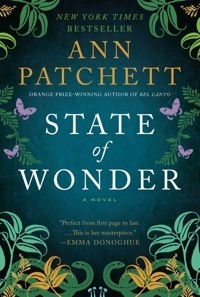 This week I read the novel State of Wonder by Ann Patchett. While there are aspects of the book I might quarrel with (the characters are mostly unlikable, and an element of the ending rang false to me), for the most part I thought it did exactly what a novel should—it entertained and enthralled. I wanted to keep turning the pages. I wanted to find out what the heck was going on and what would happen in the end. And it gave me some things to think about. A writer really can’t ask for more.
This week I read the novel State of Wonder by Ann Patchett. While there are aspects of the book I might quarrel with (the characters are mostly unlikable, and an element of the ending rang false to me), for the most part I thought it did exactly what a novel should—it entertained and enthralled. I wanted to keep turning the pages. I wanted to find out what the heck was going on and what would happen in the end. And it gave me some things to think about. A writer really can’t ask for more.
That was my reaction as a reader. As a writer, I had a slightly different reaction, and that was to marvel at the book’s structure. I recently read The Writers Journey: Mythic Structure for Writers by Christopher Vogler, which adapts Joseph Campbell’s The Hero with a Thousand Faces and applies the concept of the hero’s journey to the plots of films and novels. Now, I don’t know if Patchett had these works in mind as she was writing this book, but her plot is an almost perfect rendering of this classic story structure.
The following discussion contains some plot spoilers, so if you haven’t read the book, you might want to stop here.
Based on Campbell’s work, Vogler describes 12 stages of the Hero’s Journey:
Ordinary World. In State of Wonder, the story begins in the laboratory of Dr. Marina Singh, our hero. We see her at work and at home, in communication with her lover, Mr. Fox, and pursuing her ordinary life, which is almost immediately disrupted by the news of the death of her colleague and friend, Dr. Anders Eckman, while he was working in the Amazon.
Call to Adventure. Eckman’s wife Karen and Mr. Fox both urge Singh to go to the Amazon to find out what happened to Eckman; Fox also wants her to complete Eckman’s mission, which was to find out what was really going on with the research project Fox’s company, Vogel, was funding in Brazil. (Hmm, could Patchett have been making a sly nod to Vogler with the name she chose for this company?)
Refusal of the Call. Singh does NOT want to go, for a variety of reasons, including the fact that she thinks it odd that her lover would put her in danger.
Meeting with the Mentor. Campbell and Vogler make it clear that characters can fill the function of various archetypes, and it might be that Fox is also considered Singh’s mentor. Or maybe the mentor is Eckman, who is absent; she does recall various conversations she has had with Eckman about the mission in the Amazon, and ultimately she decides to go.
Crossing the First Threshhold. Getting to the nearest city, Menaus, Brazil, isn’t easy.
Tests, Allies, Enemies. There’s the trip, the dreams caused by the malaria drugs, lost luggage. The driver her meets her seems to be an ally. The Bovinders, who sort of work for Vogel’s chief researcher and occupy her Menaus flat while she’s out at the research station in the jungle, may or may not be allies or enemies, but they are certainly gatekeepers, meant to keep Dr. Singh away from her goal.
Approach to the Inmost Cave. But finally Singh manages to get past the gatekeepers, and travels with Dr. Swenson, the researcher, deep into the jungle. (There are possible Heart of Darkness parallels here, also.
Ordeal. Dealing with Dr. Swenson is ordeal enough, but there are other challenges as well—the bugs, the anaconda, and, most importantly, the emergency surgery Singh must perform.
Reward (Seizing the Sword). By surviving the ordeals, Singh earns a measure of acceptance and is let in on the secret of Swenson’s research.
I was serious about that spoiler alert above; here it comes!
The Road Back. Based on Swenson’s comments, Singh concludes that her colleague Dr. Eckman might still be alive, held prisoner by a nearby tribe. Taking Swenson’s assistant/adopted child Easter with her, she approaches the other tribe. But the only way to free Eckman is to give them Easter, which she does.
Resurrection. Back in the research camp, Singh and Eckman make love and make plans to return to the United States.
Return with the Elixir. Singh returns. She doesn’t quite have the drug in her possession that was supposed to be under development, but she does have the secret of the jungle.
In addition to these stages of the Hero’s Journey, Campbell and Vogler name the various archetypes of myth: Hero, Mentor, Threshold Guardian, Herald, Shapeshifter, Shadow, and Trickster. It isn’t difficult to assign these archetypal functions to the characters in State of Wonder.
This discussion doesn’t really help us understand the novel, and so familiarity with Campbell’s work isn’t at all necessary. But for me as a writer it is fascinating to see how another writer, whether consciously or not, applied this classic structure to her work.
September 5, 2012
October 1 is ZHANG BOYS Day
 My novel in stories, WHAT THE ZHANG BOYS KNOW, will be published on October 1, 2012. (Advance copies are already available, but this is the official, actual, for-real publication date.)
My novel in stories, WHAT THE ZHANG BOYS KNOW, will be published on October 1, 2012. (Advance copies are already available, but this is the official, actual, for-real publication date.)
If everybody bought a copy on October 1 . . . Or for those of you who got an advance copy, if everyone posted a review on Goodreads/Amazon on October 1 . . .
The book consists of 12 stories set in a condominium building in Washington, DC, and while it explores the lives of all the residents–a novelist struggling to finish
a book, a sculptor discovering a son he didn’t know he had, a painter obsessed with a face, a lawyer mourning his several losses, a teacher who doesn’t know what he’s lost, and more–it focuses on the life of widower Zhang Feng-qi, a Chinese immigrant, as he searches for a new mother for his young sons. And the sons–the Zhang Boys–weave through their neighbors’ lives, discovering the threads that tie them all together.
The book can be ordered through your local independent bookstore (some stores may carry it in stock–be sure to ask), from Barnes & Noble, or from Amazon.com (paperback copies will ship immediately, the Kindle version will be available on October 1.)
(paperback copies will ship immediately, the Kindle version will be available on October 1.)
For more information about the book and to read the cool blurbs that some awesome writers have given it (John Casey, Christine Schutt, Kevin Wilson, Katharine Weber, Patrick Somerville), please visit my website: http://cliffordgarstang.com/
September 3, 2012
The New Yorker: “The Casserole” by Thomas McGuane
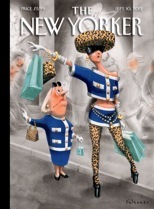 September 10, 2012: “The Casserole” by Thomas McGuane
September 10, 2012: “The Casserole” by Thomas McGuane
Mercifully short, the story is about a couple traveling to the wife’s parents’ ranch to celebrate the couple’s 25th anniversary. Along the way we learn that they never wanted children, that he’s a miser—they’ve saved and saved and so have a nest egg, and yet the drive a junker of a car, that they don’t seem to agree on much. In fact, it seems that the husband believes that his opinions are their opinions, but by the time we get to the ranch we know that he’s pretty much wrong about that. And then there is a surprise ending—Deborah Treisman in the Q&A with Thoms McGuane calls it an O. Henry ending, but McGuane doesn’t seem to know what that means—which I won’t reveal, but it has something to do with the story’s title.
Apart from the sociological commentary about the inheritance problems facing Montana ranchers, and the cute ending, which is a bit predictable, there’s not much meat on this story. As I say, it’s mercifully short.

